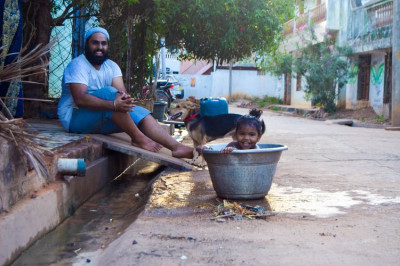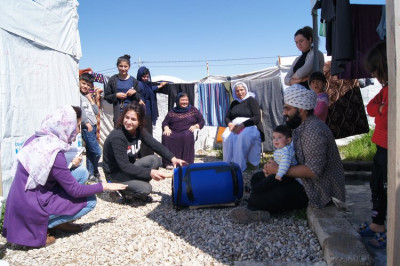News
The aerospace alumnus proving that engineers can change the world
26 January 2024


Navjot Sawhney graduated from Queen Mary in 2013 with a MEng in Aerospace Engineering. Since leaving the university, he has founded The Washing Machine Project, a social enterprise dedicated to designing and distributing manual hand-cranked washing machines to displaced and low-income people around the world.
After taking on a graduate role as a Research Engineer with Dyson, where he says he “learnt so much about design and about the user and how they interact with products," his desire to use his skills for humanitarian causes inspired him to take a sabbatical after three years, to work with Engineers Without Borders – a charity whose Board of Trustees he now sits on. “I was sent out to South India for one year and went from creating domestic appliances for middle-class people around the world for Dyson, to making clean/cook stove technology for people who can’t afford gas or wood in rural South India.”
“It was such an eye-opening experience to go from having an idea in your head, to creating it, to then testing it out in the field within three days. The year really taught me that the people in these rural areas don’t have basic things like cooking stoves, washing machines, light and bicycles – conveniences that should not just be for the rich, but for everyone.”
“For a lady to breathe in toxic smoke to do such a simple thing like cooking is unacceptable. For a lady to spend 20 hours a week washing clothes on her hands and knees for her family is also unacceptable. Engineers around the world should be changing this and they have it in their power to do so.”
“Simple tasks like collecting water were hard in the village I lived in – water would be switched on twice a day and I would miss the water pump timings every day due to work. The lights would also turn off past a certain point, so my neighbour’s son had to use my cell phone light to complete his schoolwork.”
On returning to the UK, Navjot formed a team of engineers, data scientists, communications specialists and social scientists to create The Washing Machine Project. From 2017 to 2022, he ran the project while also working full time for Jaguar Land Rover, who he credited with being very supportive of the project.
During the first few years, the team travelled to six countries and interviewed 500 people about their washing habits. “The problem runs very deep – washing up to 20 hours a week, seven days a week causes back pain, skin irritation, aches, rashes and chronic pain due to bending over and tiredness.”
Initially targeting refugee camps, the company first partnered with Oxfam to produce 50 prototypes, which they distributed in Iraq in 2020 with the support of Care International, and the United Nations. They have since partnered with Engineers Without Borders Australia to develop a South Pacific-specific washing machine, two of which were delivered to Vanatu; and Plan International Jordan, with whom they distributed 50 washing machines in the Azraq and Zataari Refugee Camps.
- The Washing Machine Project's devices use half the usual amount of water needed for a washing machine, and shave 75% off the usual running time, as well as not requiring any electricity.
- The project has now distributed 185 washing machines to 15 countries, improving the lives of 21,800 people and counting.
In 2019, Navjot invited Queen Mary Students to work with him on the project, and he says that he is grateful for the support he’s received from the university.
The Washing Machine Project has now been featured on BBC, The Guardian, ITV News, The Daily Mail, The Daily Mirror, Now This and more. The project won the Tata Varsity Pitch competition in 2021 and has been awarded and funded by the Institution of Mechanical Engineers, Santander and others.
In recent years, Navjot has gained a Masters in Humanitarianism and applied for another domain name – The Refrigeration Project – with off-grid refrigeration systems in mind.
To find out more, visit the Washing Machine Project's website.
| Contact: | Ayden Wilkes |
| Email: | a.wilkes@qmul.ac.uk |
| Website: |

